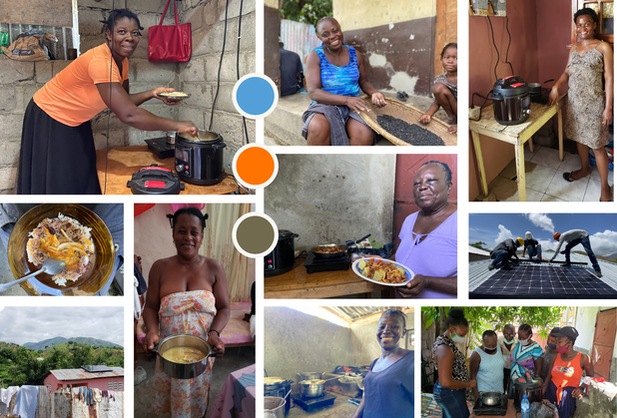|
by Andy Bilich
EarthSpark is delighted to announce the release of "Kwison Elektrik: Solar Power for Electricity Access and Electric Cooking in Haiti." The report, in partnership with SUNSPOT™ and with the UK Government's Modern Energy Cooking Services (MECS) program details the pilot project A research project in rural Haiti demonstrates the effectiveness of electric cooking technologies powered by solar microgrids to improve the quality of life for community members while generating new revenue streams and opportunities for energy access providers. The full report is available for free download here. Executive Summary: Around the world, people are realizing that fire-based cooking is neither good for the cooker nor for the climate. As urban centers with natural gas infrastructure grapple with transitioning off fossil fuels for cooking, over 2.8 billion people are still relying on biomass or kerosene to cook. Traditional cooking fuels are often expensive, bad for people’s health, and bad for the environment. “Black carbon” soot from cooking smoke lands on glaciers and lodges deep in people’s lungs. The tiny particles accelerate climate change and kill millions of people—mostly women—each year. Global “clean cooking” efforts have focused on improved cookstoves, biomass briquettes, and expansion of LPG. However, clean cooking has lagged significantly compared to the need, and the solutions have often not fully solved the problems. Recent initiatives focusing on electric cooking are a welcome shift. For too long access to electricity and access to improved cooking technology have been siloed. Combining the two issues has the potential to more effectively meet people’s basic needs while boosting the business model for solar-powered electricity systems in remote communities. This study explores the potential of electric cooking in rural Haiti by deploying electric pressure cookers and induction stoves with integrated smart meters in 20 households connected to a community scale solar PV microgrid as well as cookers and stoves supported by stand-alone solar+battery systems in 8 off-grid households. Overall, the pilot project has showcased the value of electric cooking for both local communities and microgrid operators. Key findings indicate that electric cooking in this context is a:
0 Comments
Your comment will be posted after it is approved.
Leave a Reply. |
EarthSpark supporters make our work possible. Thank you for considering a donation towards eliminating energy poverty in Haiti.
Read the full blog - click here!
|
EarthSpark International is a non-profit 501(c)3 organization.

